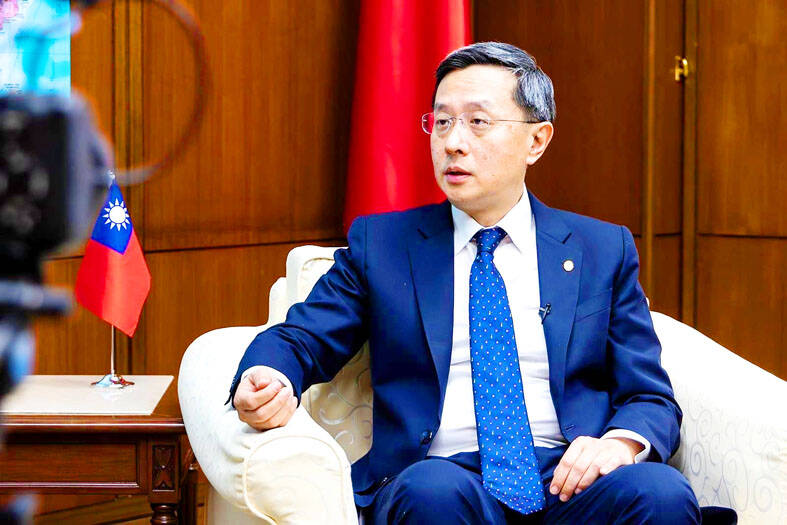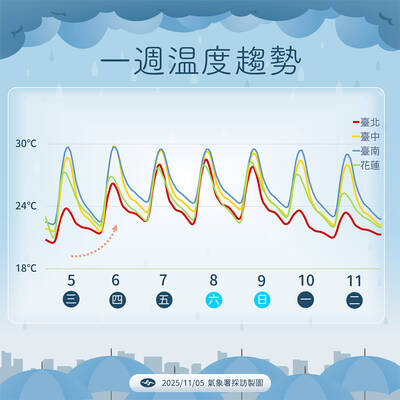Taiwan has never been part of the People’s Republic of China (PRC), Representative to the EU and Belgium Roy Chun Lee (李淳) wrote in an opinion piece published on the European news Web site Euractiv on Friday, as he called for Europe to help deter coercion in the Taiwan Strait.
The Taipei Representative Office in the EU and Belgium shared the piece, saying that it presents “Taiwan’s perspective on its identity and role in the international community, in response to a previously published sponsored article by the Mission of China to the EU.”
The office was referring to an article by Chinese international affairs commentator Xin Ping titled “Taiwan, inseparable from China under international law,” which was published on Euractiv on July 11.

Photo courtesy of the Ministry of Foreign Affairs
Xin said that the passage of UN Resolution 2758 in 1971 defined the PRC as having sovereignty over Taiwan, and that that was never in question and is not up for debate.
Lee in the opening paragraph of his article said that “Taiwan has never been part of the PRC, not even for a single day.”
“Since the cession of Taiwan by the Qing Dynasty to Japan in 1895, no government in China has ever exercised its jurisdiction over Taiwan,” Lee said. “In fact, during the 75 years since the PRC’s founding in 1949, Taiwan has existed as a sovereign state under its official name, the Republic of China [Taiwan].”
“This is the ‘status quo,’” he said, adding that Taiwan’s existence as a sovereign state is a fact, and that it does not need UN membership for justification.
Over the past 130 years, like many European nations, Taiwan has forged a unique identity through a multicultural heritage from Chinese, Dutch, Spanish, Japanese and indigenous peoples, he said.
The existence of Taiwan as a sovereign nation with a unique identity can be seen in its achievements — an economic, democratic and global technology powerhouse, Lee said.
On top of its semiconductor achievements, Taiwan ranked as the world’s 21st-largest economy last year, is ranked 12th in the world and first in Asia by the Democracy Index, and is number one in Asia in several freedom indexes, he said.
The achievements “demonstrate that not only does Taiwan exist independently, but it is also an impactful and inseparable member of the international community,” he added.
However, the PRC continues to employ various methods to deny Taiwan’s sovereign existence and distorts the meaning of UN Resolution 2758 to claim that the nation is part of China, he said.
“UN Resolution 2758 is very short — only 150 words. And among those 150 words, the word ‘Taiwan’ does not appear,” he cited European Commissioner Nicolas Schmit as saying last year.
As the resolution provides no legal basis for the PRC to claim ownership of Taiwan or to deny the fact that it is a sovereign, independent and meaningful country, China has doubled down on more aggressive and malignant tactics toward Taiwan and its neighboring countries, including military intimidation and economic coercion, he said.
Lee outlined three ways Europe could help deter coercion in the Taiwan Strait:
First, it must face the fact that Taiwan is a democracy whose sovereignty is exercised daily by its 23 million people.
Second, it should expose and resist coercion by calling out and rejecting the PRC’s disinformation campaigns, economic blackmail and military intimidation.
Third, it must invest in a partnership with Taiwan by expanding cooperation in trade, technology, security dialogue and cultural exchanges, so that shared values could become shared resilience.

Three Taiwanese airlines have prohibited passengers from packing Bluetooth earbuds and their charger cases in checked luggage. EVA Air and Uni Air said that Bluetooth earbuds and charger cases are categorized as portable electronic devices, which should be switched off if they are placed in checked luggage based on international aviation safety regulations. They must not be in standby or sleep mode. However, as charging would continue when earbuds are placed in the charger cases, which would contravene international aviation regulations, their cases must be carried as hand luggage, they said. Tigerair Taiwan said that earbud charger cases are equipped

Foreign travelers entering Taiwan on a short layover via Taiwan Taoyuan International Airport are receiving NT$600 gift vouchers from yesterday, the Tourism Administration said, adding that it hopes the incentive would boost tourism consumption at the airport. The program, which allows travelers holding non-Taiwan passports who enter the country during a layover of up to 24 hours to claim a voucher, aims to promote attractions at the airport, the agency said in a statement on Friday. To participate, travelers must sign up on the campaign Web site, the agency said. They can then present their passport and boarding pass for their connecting international

UNILATERAL MOVES: Officials have raised concerns that Beijing could try to exert economic control over Kinmen in a key development plan next year The Civil Aviation Administration (CAA) yesterday said that China has so far failed to provide any information about a new airport expected to open next year that is less than 10km from a Taiwanese airport, raising flight safety concerns. Xiamen Xiangan International Airport is only about 3km at its closest point from the islands in Kinmen County — the scene of on-off fighting during the Cold War — and construction work can be seen and heard clearly from the Taiwan side. In a written statement sent to Reuters, the CAA said that airports close to each other need detailed advanced

UNKNOWN TRAJECTORY: The storm could move in four possible directions, with the fourth option considered the most threatening to Taiwan, meteorologist Lin De-en said A soon-to-be-formed tropical storm east of the Philippines could begin affecting Taiwan on Wednesday next week, the Central Weather Administration (CWA) said yesterday. The storm, to be named Fung-wong (鳳凰), is forecast to approach Taiwan on Tuesday next week and could begin affecting the weather in Taiwan on Wednesday, CWA forecaster Huang En-hung (黃恩鴻) said, adding that its impact might be amplified by the combined effect with the northeast monsoon. As of 2pm yesterday, the system’s center was 2,800km southeast of Oluanbi (鵝鑾鼻). It was moving northwest at 18kph. Meteorologist Lin De-en (林得恩) on Facebook yesterday wrote that the would-be storm is surrounded by